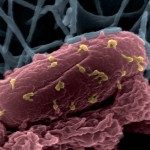Link to Pubmed [PMID] – 37632068
Link to DOI – 10.3390/v15081726
Viruses 2023 Aug; 15(8):
The immune system offers several mechanisms of response to harmful microbes that invade the human body. As a first line of defense, neutrophils can remove pathogens by phagocytosis, inactivate them by the release of reactive oxygen species (ROS) or immobilize them by neutrophil extracellular traps (NETs). Although recent studies have shown that bacteriophages (phages) make up a large portion of human microbiomes and are currently being explored as antibacterial therapeutics, neutrophilic responses to phages are still elusive. Here, we show that exposure of isolated human resting neutrophils to a high concentration of the Pseudomonas phage PAK_P1 led to a 2-fold increase in interleukin-8 (IL-8) secretion. Importantly, phage exposure did not induce neutrophil apoptosis or necrosis and did not further affect activation marker expression, oxidative burst, and NETs formation. Similarly, inflammatory stimuli-activated neutrophil effector responses were unaffected by phage exposure. Our work suggests that phages are unlikely to inadvertently cause excessive neutrophil responses that could damage tissues and worsen disease. Because IL-8 functions as a chemoattractant, directing immune cells to sites of infection and inflammation, phage-stimulated IL-8 production may modulate some host immune responses.

